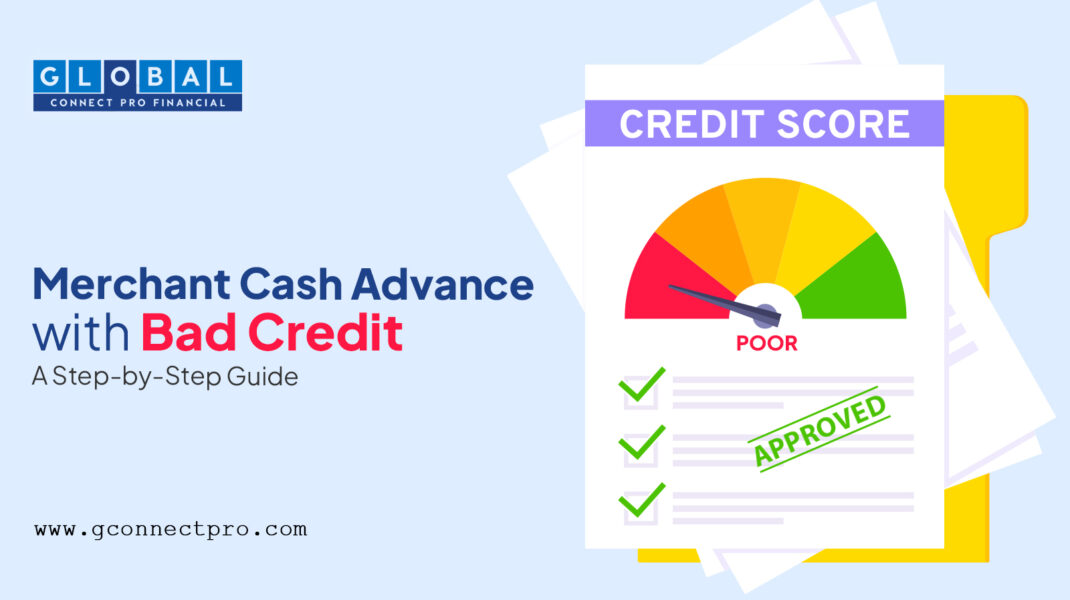How to Secure a Merchant Cash Advance with Bad Credit

Securing financing can be challenging, especially when your credit score is less than ideal. However, a Merchant Cash Advance (MCA) offers a viable solution for businesses with bad credit. MCAs are unique financing options that focus on your business’s daily sales rather than your credit history, making them accessible even to those with poor credit.
If you’re looking to secure an MCA, here’s everything you need to know about the process and how to improve your chances of approval.
What Is a Merchant Cash Advance (MCA)?
A Merchant Cash Advance is not a traditional loan. Instead, it’s an advance against your future sales. MCA providers give you a lump sum of money, which you repay through a percentage of your daily or monthly credit card sales.
Key Features of an MCA:
- No Collateral Needed: Your business’s sales are the primary factor for approval.
- Fast Approval Process: Funds are often available within 24–48 hours.
- Flexible Repayment Terms: Payments are automatically deducted as a percentage of sales, adjusting to your cash flow.
Why Bad Credit Doesn’t Have to Be a Dealbreaker
Unlike traditional lenders, MCA providers prioritize your business’s sales performance over your credit score. Here’s why:
- Focus on Revenue: MCA providers analyze your daily or monthly revenue to determine if you can repay the advance.
- No Lengthy Credit Checks: While some providers may check your credit, it’s not the deciding factor for approval.
- Sales History Matters More: Consistent and sufficient sales are more important than a perfect credit score.
Steps to Secure a Merchant Cash Advance with Bad Credit
1. Assess Your Business Sales History
Your sales history is the foundation of MCA approval. Lenders want to see consistent and stable sales that prove your ability to repay the advance.
- Tip: Gather at least 3–6 months of sales data from your business.
2. Choose the Right MCA Provider
Not all MCA providers are the same. Look for lenders that specialize in working with businesses that have bad credit.
- Tip: Research providers with transparent terms and strong reputations to avoid predatory practices.
3. Prepare the Necessary Documentation
Even though MCAs don’t require extensive paperwork, you’ll still need to provide certain documents:
- Bank statements (3–6 months).
- Credit card processing statements.
- Business license and identification.
- Tax returns (if required).
4. Be Honest About Your Credit Situation
While your credit score may not be the focus, honesty is key. If a provider conducts a soft credit check, being upfront about your financial history can speed up the process.
5. Highlight Your Business’s Strengths
Even with bad credit, showcasing strong sales performance and good customer retention can boost your approval chances.
- Tip: If your business experiences seasonal spikes, provide evidence of those peak periods.
6. Understand the Terms and Costs
MCAs often come with higher costs than traditional loans due to the increased risk for the lender.
- Look at the factor rate (often ranging from 1.1 to 1.5). This determines the total repayment amount.
- Understand repayment terms and how much will be deducted from your sales.
Pros and Cons of an MCA with Bad Credit
Pros:
- Quick Funding: Get access to cash within days.
- Credit Flexibility: Approval doesn’t rely on a high credit score.
- Adjustable Payments: Repayments align with your business’s sales.
Cons:
- Higher Costs: MCAs tend to have higher factor rates compared to traditional loans.
- Short-Term Solution: They’re best suited for immediate cash needs, not long-term financing.
- Daily Deductions: Frequent payments can strain businesses with inconsistent sales.
Tips to Improve Your Approval Odds
- Boost Your Sales Performance:- Even small increases in daily sales can make a big difference. Consider promotions, upselling, or offering new products to drive revenue.
- Work with a Co-Signer or Partner:- If possible, involve a business partner or co-signer with a stronger financial standing to enhance your application.
- Build Relationships with MCA Providers:- Establishing trust with an MCA provider can make future approvals smoother, even with bad credit.
- Avoid Over-Borrowing:- Borrow only what your business truly needs and can repay. Overextending yourself can create financial stress.
When Is an MCA the Right Choice?
An MCA is ideal if:
- You need fast funding for urgent expenses, such as equipment repairs or inventory restocking.
- Your business has consistent credit card or daily sales to support repayments.
- You’ve been turned down for traditional loans due to bad credit.
Conclusion
Securing a Merchant Cash Advance with bad credit is entirely possible if your business has strong sales performance and meets basic requirements. By understanding the process, choosing a reputable provider, and preparing the necessary documentation, you can access the funds needed to keep your business running smoothly.
While MCAs are a convenient option, be mindful of their higher costs and short-term nature. Use them strategically to address immediate financial needs, and work on improving your credit over time to access more affordable financing in the future.


Write a reply or comment
You must be logged in to post a comment.